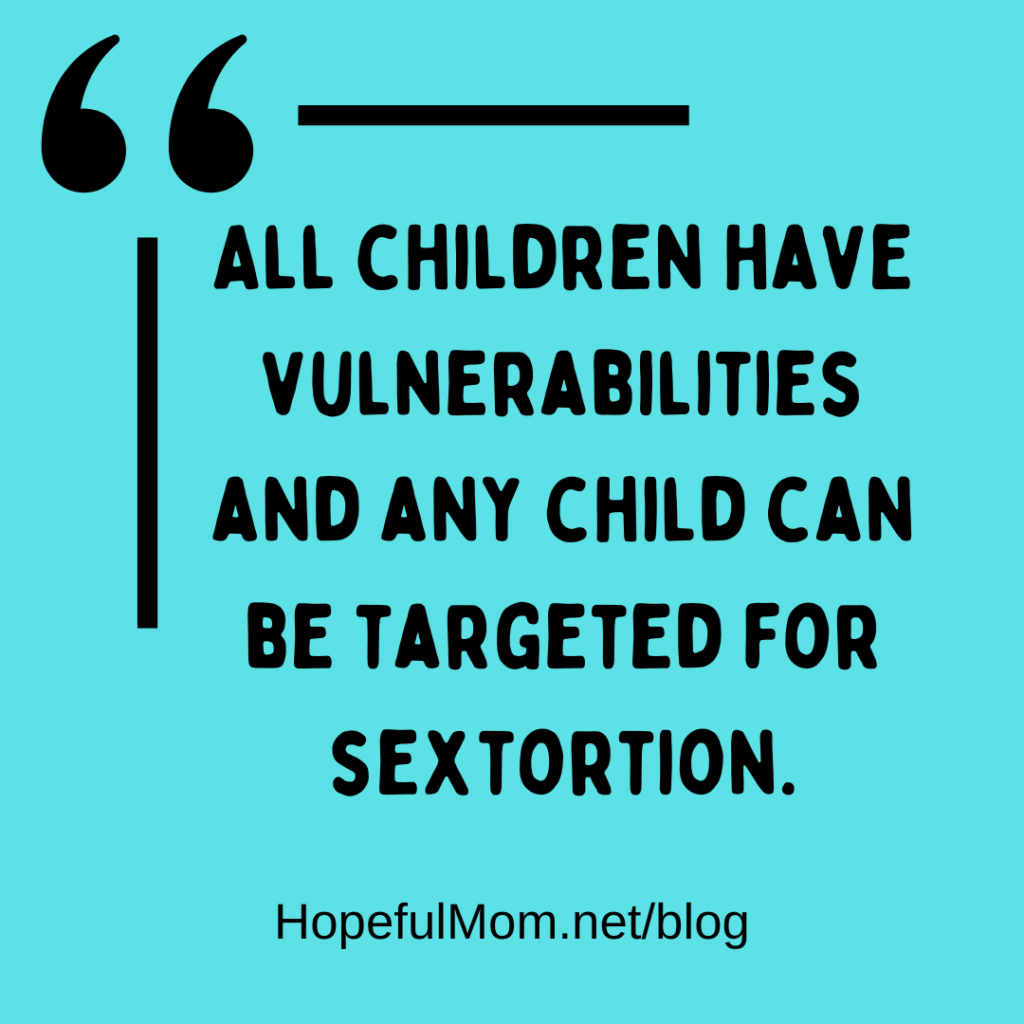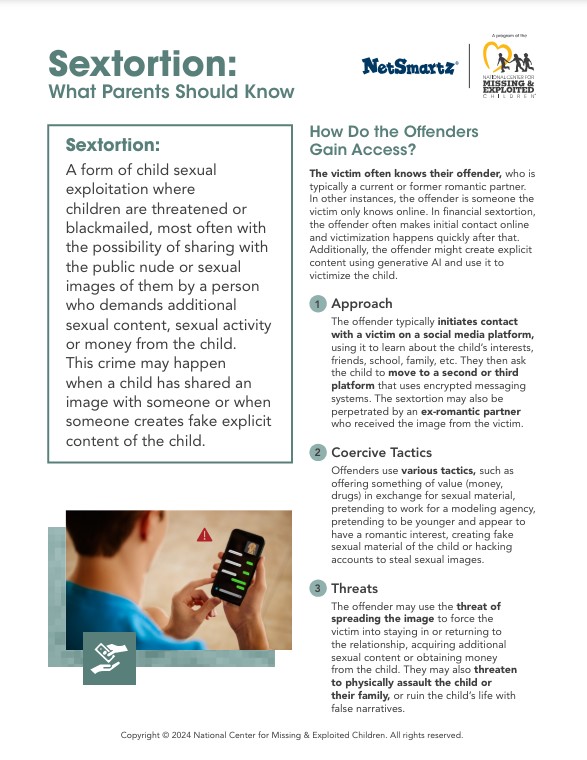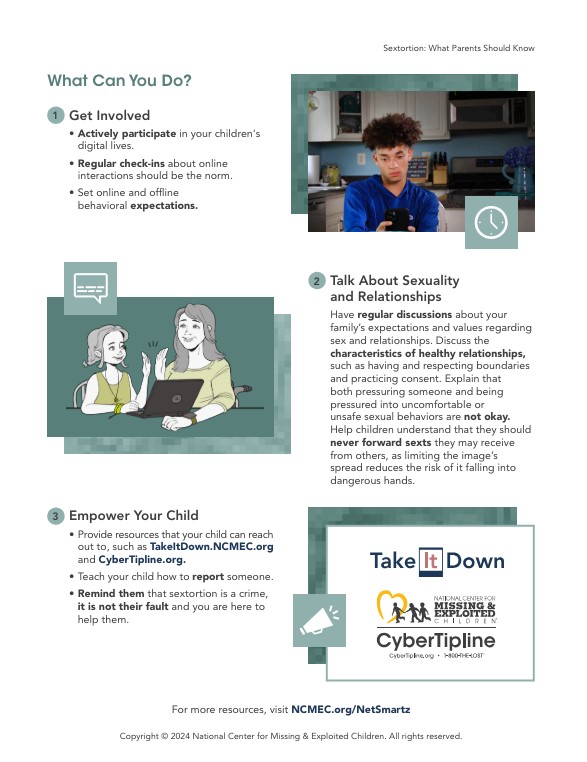Sextortion. One of several threats to our children. Parents, we should be aware of the danger and talk with our children.
What is sextortion?
Sextortion is “extortion in which a perpetrator threatens to expose sexually compromising information (such as sexually explicit private images or videos of the victim) unless the victim meets certain demands.”[i] They may demand additional sexual content, sexual activity, or money. Victims often know their extorters. A current or former boyfriend or girlfriend may have an image the victim sent to them confidentially believing their interaction was personal and private. Then the offender uses the content against them.
In other cases, victims haven’t met their blackmailer in person. I’ve heard several stories of teens who have taken their own lives after they were sextorted online. One such teenage boy thought he was interacting with a teen girl on Instagram. Only it wasn’t a teen girl. And the predators recorded the “sexual encounter.” They then threatened to send the video to his friends and family if he didn’t pay them. He took his own life.
Boys and girls alike get caught in these schemes. These preteens and teens believe wholeheartedly they’re communicating with a peer or someone who loves them. They trust the person on the other end of the screen. The victim complies with requests made under false pretenses. Then the threats begin. Sometimes offenders ask for money. Other times they ask for more images or videos which are then be uploaded to pornographic sites.
Both boys and girls can be targeted for sextortion, a form of blackmail. They are targeted in person by people they know and online. What Parents Need to Know About Sextortion #sextortion #socialmedia #parenting Share on XI attended a webinar last week with 500 other people, a record-breaking turnout for Survive and Thrive Advocacy Center, the organization that sponsored the event. The webinar covered social media, substance abuse, and gaming. Specifically, the speaker showed how these issues connect to sextortion and human trafficking. The number of people in attendance signaled to me how important this information has become and how driven we are to figure out how to help the next generation.
Social Media
Social media has been a topic in the news recently because the US Surgeon General called for warning labels on social media platforms “to alert users that the platforms can harm children’s mental health.”[ii] Whether or not we agree with the Surgeon General’s request, most parents want to protect their children from any type of harm. To that end, our children should understand the down side to social media—mental health issues, bullying, brain development problems, and potential exposure to predators who will attempt to lure them into trafficking or sextortion.
A startling fact emerged from the webinar: Low risk children can be caught in this behavior, too. Everyone has a vulnerability. Traffickers and predators are master manipulators. They know how to use vulnerabilities, whatever they may be.

We tend to believe only at-risk youth will be lured into sextortion or trafficking. At-risk includes youth who live in poverty or whose parents are divorced or are part of the LGBTQIA2S+ community, along with a host of other situations. However, there’s a difference between at-risk youth and those who have a vulnerability.
We all have vulnerabilities, and they may change from day to day. A student may have a great home life, get good grades, and be the best on the soccer team. However, she may still feel insecure from time to time. An unfriendly remark could be a source of pain one day but not bother her a week later. Traffickers and sextortionists know when to swoop in and what to say in order to manipulate her into their nets.
All children have vulnerabilities and any child can be targeted. So, what are some effective ways to keep our children safe?


Safety Measures
- Interact. Be available. Have difficult conversations. Show them you’re willing to talk about anything and everything. Remind them frequently that you love them unconditionally, are available when they’re on top of the world and when they’re in trouble, and you are on their side. Protecting teens begins with cultivating a healthy relationship.
- Talk about healthy relationships and how to spot healthy versus unhealthy interactions.
- Educate yourself on the latest social media apps and games. Before your child installs a new app or gets a new game, ask them about it. Try it out yourself.
- Use filters and parental controls. Enable “installing apps” restrictions on their phones.
- Monitor online activity.
- Ask your teens to keep their social media platforms on private and not to share personal information, especially in a personal message.
- “Remind them that sextortion is a crime, it is not their fault and you are here to help them.”[iii]
If your organization, church, or homeschool group needs a speaker, check out the speaking page at Hopeful Mom and send me an email.
[i] https://www.merriam-webster.com/dictionary/sextortion
[ii] https://www.washingtonpost.com/technology/2024/06/17/surgeon-general-social-media-warning-labels/
[iii] https://www.missingkids.org/content/dam/netsmartz/downloadable/tipsheets/sextortion-what-parents-should-know.pdf
About the author
Barb Winters is the author of Sexpectations: Helping the Next Generation Navigate Healthy Relationships and founder of Hopeful Mom. She’s a certified mental health coach and offers one-on-one consultations for parents. For more about Barb, click "About" in the menu.



